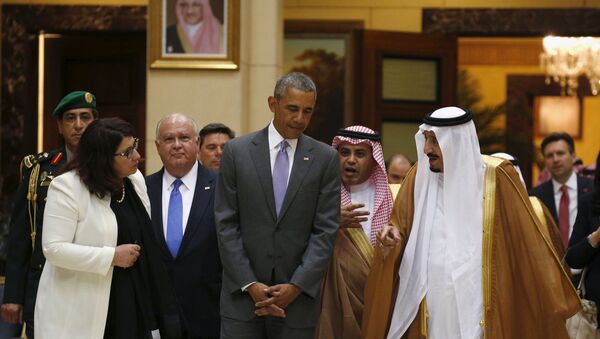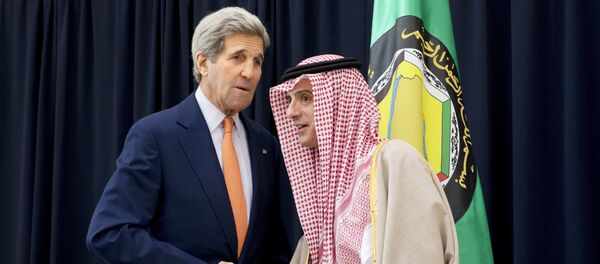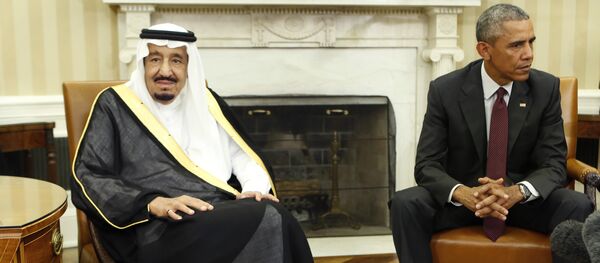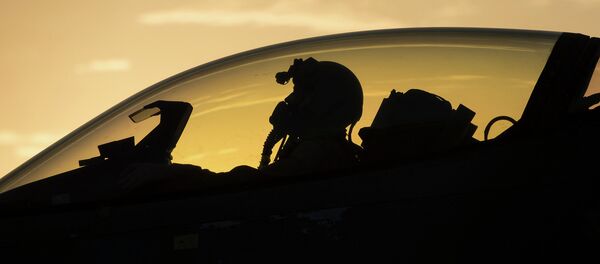United States President Barack Obama arrived Wednesday to Saudi Arabia to meet King Salman and to attend a meeting with leaders of six Gulf Cooperation Council (GCC) countries which will take place on Thursday.
There is a definite cooling in US-Saudi relations over Iran's nuclear deal and the Syrian crisis.
Remarkably, Riyadh openly demonstrates its discontent with the Obama administration's foreign policy. Moreover, CNN reports that President Obama "received a chilly reception from Saudi Arabia's leaders" on his arrival to Riyadh on Wednesday.
Riyadh went even so far as to blackmail Washington, threatening to dump the US dollar if Congress passes a bill which would allow the US to investigate their alleged involvement in the 9/11 case and hold them responsible for it.
"They [Saudi Arabia] are threatening [to dump the dollar] and they are capable of it and it shows you how fragile this [the US'] system is and how ridiculous our foreign policy is."
Indeed, some allies appear to be "like a mouse in the provision bag, a serpent in one's lap and a fire in one's bosom," as an old proverb says.
The question then arises: who needs this partnership the most — Washington or Riyadh?
"Whether such relations are good comes down to whether an alliance-type relationship with the particular state has something in it for the United States. It is a question of whether the other country is doing something that protects or advances US interests, and more specifically whether it is doing it only because it is in an 'alliance' with the United States and would not be doing it for its own reasons anyway," CIA veteran and Nonresident Senior Fellow at the Brookings Institution Paul Pillar writes in his article for The National Interest.
Washington is unwilling to take Saudi Arabia's side in regional rivalries, "especially its rivalry with Iran," Pillar notes.
"It is the Saudis, not the Iranians, who are supporting rebels trying to overthrow the incumbent regime [in Syria]… it was the Saudis, not the Iranians, who rolled their tanks across the causeway into Bahrain," Pillar stresses, adding that Riyadh's invasion of Yemen "has been much more destructive" than "anything that can be attributed to indirect Iranian involvement in the form of aid to the Houthis."
Likewise Washington is unwilling to deploy a significant American military contingent in Syria to topple Bashar al-Assad.
In addition, the United States is less dependent on Saudi oil as it used to be. And it means that Riyadh does not have Washington on a crude string now.
Indeed, the US-Saudi relations lack "warmth," but there is nothing particularly wrong with it, according to the CIA veteran.
"It is in the interests of both the United States and Saudi Arabia to have a businesslike relationship in which leaders and diplomats of the two countries regularly engage on a full range of issues that concern them," Pillar stresses.
Perry Cammack and Richard Sokоlsky of the Carnegie Endowment for International Peace shared Pillar's stance in their mid-April analysis for The National Interest.
The US scholars noted that Riyadh must reconcile its expectations with the reality.
"The new normal will be a more diffident US-Saudi relationship. Both sides will harbor lower expectations of each other and continue to disagree, sometimes sharply, over important regional security issues, but will seek accommodations when their interests overlap," the scholars suggested.





